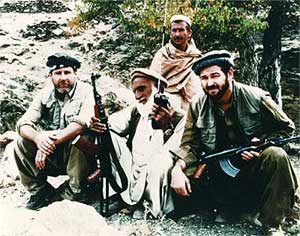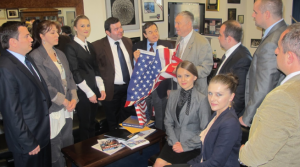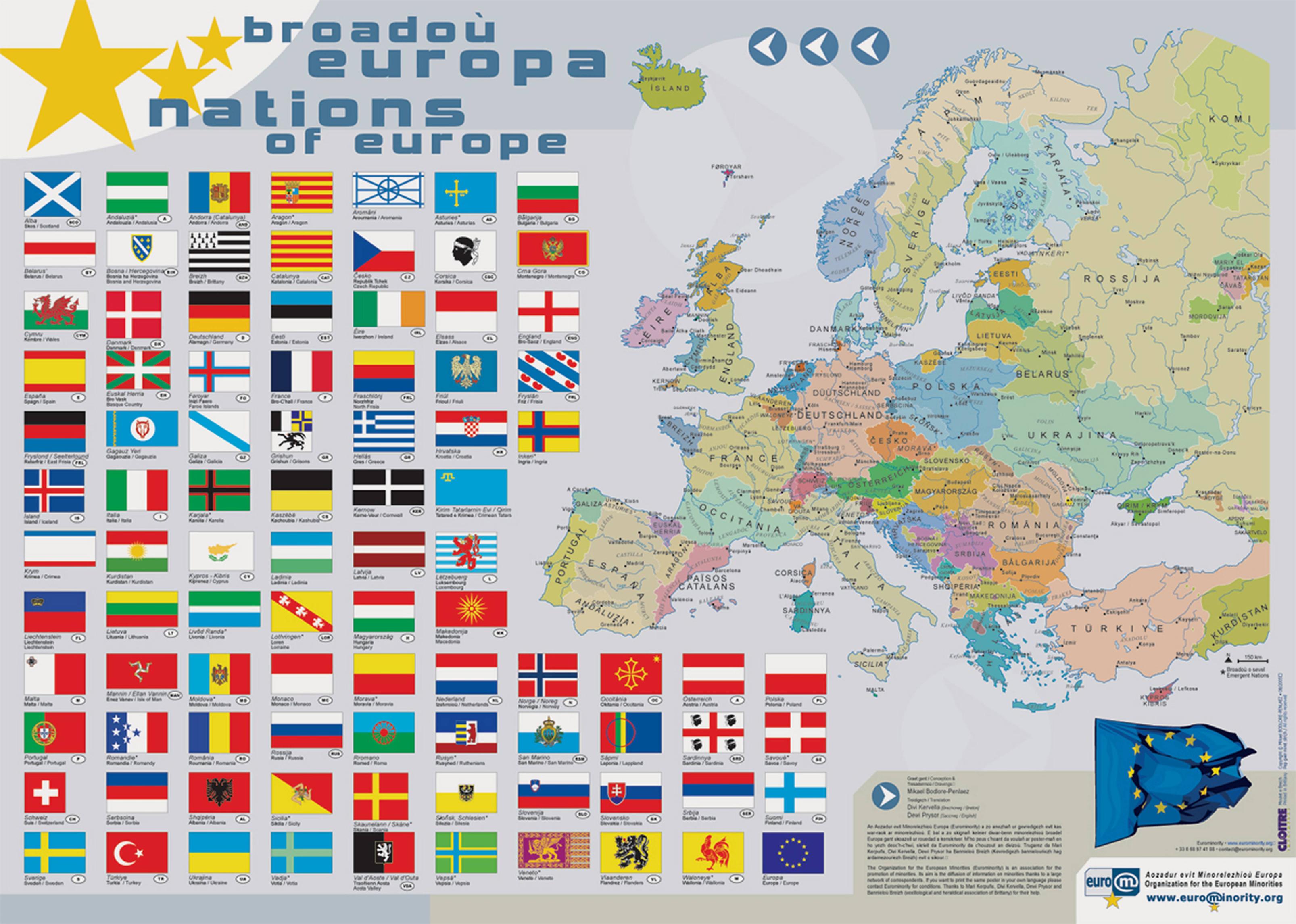Anyone living in the 21st with internet access can attest to the fact that quite literally any mention of “Macedonia” on Twitter will trigger the professional Greek troll team to endlessly copy and paste insults and semi-literate responses. If a BBC headline stated, “Meteor to Strike Macedonia Tomorrow, Humanity is Finished” you can bet your bottom dollar that it will still be spammed with the usual “You Mean SKOPIA” “FAKEDONIA! and “ALEXANDROS WAS GREEK!!!!” by our Greek internet warriors.
What’s sad, of course, is the people who claim they birthed Western Civilization and plundered the walls of Troy now find themselves in a dystopian nightmare—perpetually glued to their computer monitors for hours on end. With no end in sight, they are the modern Sisyphus, carrying their burden each and every day, only to start anew the next day. However, they do derive a sense of purpose from this otherwise nihilistic form of existence. After all, they liken themselves to the modern-day Spartans, fearlessly defending Hellenic heritage.
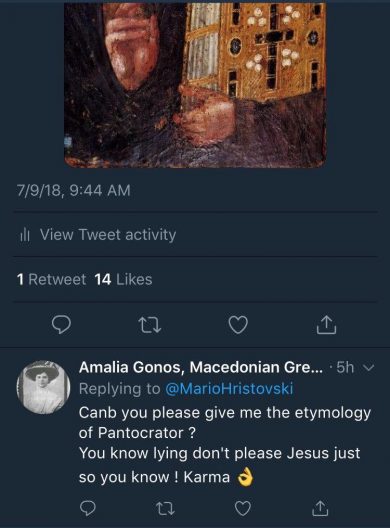
Like real ancient Hellene warriors, they usually live in Australia and command anywhere from 5-20 followers and hide their true faces and names, as all proud warriors did in ancient times. Most insulting, however, is they are probably being paid next to nothing for their time and efforts by their local diaspora groups. Truly, a Homeric tragedy for a 21st century audience.
Of course, those of us with actual jobs, careers, and lives, laugh at this absurdity. Some of my most ardent Greek fans quite literally sit and wait for me to Tweet to unleash their “truths”. The best part? Most don’t even follow me on Twitter. And even more don’t even find me by using the hashtag #Macedonia—they quite literally will reply to any topic I post. But as I say, free mental real estate is never bad!
However, in response to the canned regurgitated responses copied and pasted by our fearless Hellenic internet warriors , I came up with a meme to seize upon this phenomena. Realizing the absurdity of focusing on solely ancient Macedonian history, a tiny fraction of the 2,500 year old documented Macedonian history, the “BUT MY COINS” meme was born. Ironically, my version of it captured a decent share of the arguments circulating Twitter and Facebook. Of course, the intellectual prowess of our Greek internet warriors cannot be contained in one immature meme. Of course not, it will never do them justice. We need a Top 10 List to do it. So without further ado, I present:
Top Ten Greek Arguments
1. BUT MY COINS!!!
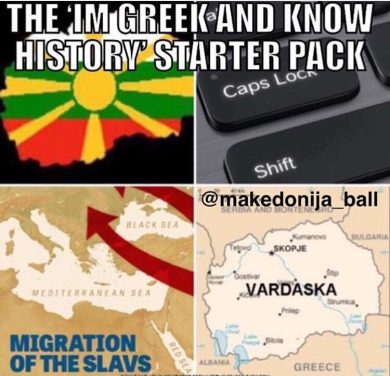 The coup de grace of Greek arguments. The final stake in the heart of the Macedonian identity. After all, how could we be Macedonians when 2,500 years ago, our ancestors wrote their coins in Greek? I suppose this is the new litmus test for all people’s identities. When we find the ancestors of the French once wrote in a Celtic language, President Macron will be in for a shock that he can’t truly be French. Of course, we know that Greek was the lingua franca of the Mediterranean world and there are coins in Greek all the way in Afghanistan. The use of Greek on coins, especially by a Hellenized monarchy, in no way points to the ethnicity of the people as a whole. Meanwhile the Greeks also receive some sort of undeserved satisfaction being able to read very basic ancient Greek words off of coins like “ΑΛΕΧΑΝΔΡΟΥ” “ΦΙΛΙΠΠΟΥ” or “ΒΑΣΙΛΕΥΣ”. Really impressive. Hats off, lads. Let’s read the Iliad in the original Homeric Greek next.
The coup de grace of Greek arguments. The final stake in the heart of the Macedonian identity. After all, how could we be Macedonians when 2,500 years ago, our ancestors wrote their coins in Greek? I suppose this is the new litmus test for all people’s identities. When we find the ancestors of the French once wrote in a Celtic language, President Macron will be in for a shock that he can’t truly be French. Of course, we know that Greek was the lingua franca of the Mediterranean world and there are coins in Greek all the way in Afghanistan. The use of Greek on coins, especially by a Hellenized monarchy, in no way points to the ethnicity of the people as a whole. Meanwhile the Greeks also receive some sort of undeserved satisfaction being able to read very basic ancient Greek words off of coins like “ΑΛΕΧΑΝΔΡΟΥ” “ΦΙΛΙΠΠΟΥ” or “ΒΑΣΙΛΕΥΣ”. Really impressive. Hats off, lads. Let’s read the Iliad in the original Homeric Greek next.
2. BUT MY SLAVIC MIGRATION!!!
BARBARIC SLAVS. DIRTY SLAVS. Replace “Slav” with “Jew” in any Greek capslock-ridden outburst and you’re back to 1933 Germany. How dare we usurp proud Hellenic heritage being a bunch of barbaric Slavs from the swamps? Except we aren’t. Modern geneticists have demonstrated thoroughly that Macedonians are indigenous to the Balkans. Get yourself a DNA test if you don’t believe me! Meanwhile the whole Slavic migration is also being seriously questioned. Modern anthropology and archaeology sees it was primarily a linguistic spread with changing socio-political stratification, and no major demographic displacement. For a complete breakdown on why we are not the result of a medieval migration to the Balkans please check out my previous article.
3. BUT MY “VARDASKA”!!! 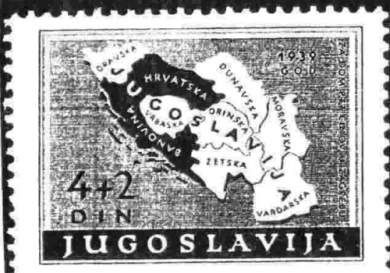
Using Mossad-style intelligence, our Greek friends have unearthed a doozy. A stamp showing our true name was Varda(r)ska? Woe unto us! Could this be it? Were we really Vardarska Banovina pre-1944. Of course not. In a euphoric rush to spam the stamp all over Twitter and derive some semblance of meaning from their lives, they seem to have not physically looked at it. The stamp shows the administrative provinces of Yugoslavia, called Banovinvas. Not only do these Banovinas not correspond to any borders of any modern-day country, but ALL former Yugoslav states have their Banovina title. Look closely–there’s no Serbia, Bosnia, Slovenia, etc. I’m eagerly anticipating the push to rename Serbia Moravska or Drinska Banovina!
4. BUT MY TITO!!!
Druze Tito. The Great Manipulator. If you don’t think Tito is quite literally the most impressive human being ever to walk the earth, buckle up– you’re in for a wild ride. Let’s set the stage– 1944 rolls around and Tito wants to invade and annex Aegean Macedonia for communism. Not only would he risk invading an Allied state full of British soldiers, but he will use history to do it! Because, as we all know, in the midst of
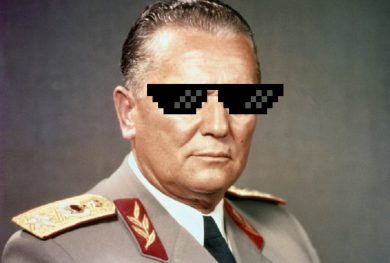
the carnage of World War II, history lectures were all the rage in determining invasion plans. Quite literally overnight Tito used this WEIRD OLD TRICK to brainwash more than a million proud Bulgarians into thinking they’re Macedonians to lay claim to Greek Macedonia. My Dedo, born in 1936 (before Socialist Yugoslavia was even a state) had his memory so completely wiped that he didn’t even remember being born a Bulgarian inside of Vardarska Banovina! However, does the miraculous feat of Tito end there? Of course not! To solidify his claims, he fired up the old Yugo fitted with a Flux Capacitor and time traveled to the 1800s, and forcibly made thousands of Macedonian immigrants coming to Ellis Island write “Macedonian” for their nationality. He also used his persuasive magic on Gjorgi Pulevski, Nikola Karev, Jane Sandanski, Krste Petkov Misirkov, Dimitar Vlahov, and Goce Delcev to also differentiate themselves from Bulgarians. After all, without Tito it would have been “Freedom or Death for Bulgarian Vardarska Banovina”! Truly, the criminal mastermind of the century—bending the time and space fabric to usurp Greek history!
5. BUT MY INSCRIPTIONS!!!
Same point as the Greek coins. The use of Greek in no way points to the ethnicity of a population being ruled by a heavily Hellenized monarchy. However, a couple of additional points here:
- There are no Greek inscriptions before the 500s BCE leaving an unaccounted gap in Macedonian history of about three centuries.
- Macedonians imported Greek masons and inscribers to write their texts, and we know this because the inscriptions are all written in the native dialect of the Greek carving them.
- The Pella Curse Tablet, used as evidence for a native Greek speaking populace follows absolutely no accepted Macedonian morphology, and is riddled with basic spelling errors, even the most basic Greek word ΕΙΜΙ (I am) was misspelled!
- Ancient Macedonian was an oral language, like Illyrian and, to an extent, Thracian. Of it, some 300 glosses survive, showing it to be a an Indo-European language, with similarities to Greek but altogether distinct.
-
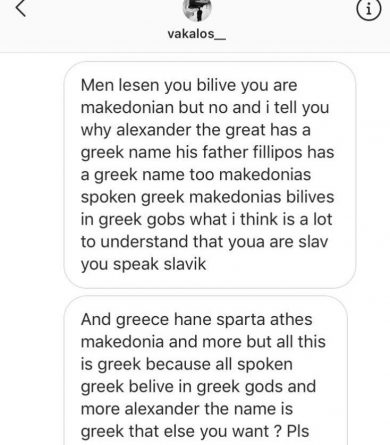
Nailed it. 6. BUT MY ANCIENT GREEK NAMES!!!
Alexander means “Defender of Men”. Phillip means “Lover of Horses”. And to add insult to injury, truly, where is Aleksandrovski in the inscriptions?! Nowhere to be found? That’s it, we are done. Now that we have the laughs out of our system let’s get down to brass tacks.
- Macedonian monarchs were thoroughly Hellenized by Alexander’s day and wanted to be accepted as Greeks. No surprise their names would reflect this.
- Greeks also Hellenized every foreign name imaginable. So, we truly don’t know if the names are authentically theirs. Xerxes? Try Xšayaṛša. Cheops? Nope, it’s Khufu. Porus? Try this on for size–Purushottam. And the beauty of it? All these Hellenized names have meanings in Greek, even if they aren’t originally Greek!
- There are a plethora of ancient Macedonian common names that are not Greek. Ever hear of Dagina, Sabattaras, Apaqos, or Kebba in Greek? No? Me neither.
- Macedonian names today are about 1/3 Classical, 1/3 Orthodox Christian, and 1/3 Slavic.
7. BUT MY GREEK GODS!!!
Same line of reasoning as before. Greeks made Hellenized copies of foreign pantheons as well. They found a Herakles god in India, and an Athena goddess in Arabia! The actual Macedonian pantheon would have been alien to the Greeks with gods and goddesses such as Bedu, Akrea, Thaulos, Darron, and Wolganos. Moreover, Alexander was polytheistic; he sacrificed to Egyptian and Persian gods as well. But let’s not forget a juicy nugget of information that Greeks seem to omit. According to Herodotus, the Greek gods are actually imported…from Egypt!
8. BUT MY OLYMPIC GAMES!!!
Yes, Alexander I the “Phillhellene” participated in the Olympic games. However he was initially politely turned back the Greek judges being told,“Sorry, only Greeks–no barbarians”. Couple of things to point out here:
- His title was Phillhellene (friend of the Greeks) whose primary purpose as a title was applied to foreign princes who were lovers of Greek culture.
- The Greekness of Macedonians was not readily accepted by Greeks
- Being called barbarian literally meant “foreign” and “non-Greek speaking”. Yes, it also means culturally backward, but its primary meaning, once again, means non-Greek speaker. But being “backwards” was not the cut-off for participation–being non-Greek was.
To mitigate this, Alexander came up with a mythical origin story from the Greek city of Argos in the Peloponnesus. Of course, this was a word play, since Macedonians descended from Argos Ortestida in Macedonia. Even ancient historians knew that it was not the Argos in Greece, such as Appian of Alexandria. However, after being accepted as Greek, this only extended to the monarchy; the kings were referred to as “Greeks ruling over Macedonians”, showing the people were still considered foreigners. [Herodutus, The Histories, 5.20]
9. BUT MY MALESEVSKI LETTER!!!
Apparently if Goce Delcev thought we were Bulgarians, he speaks for ALL Macedonians and also does away with any anthropological and historical evidence to prove otherwise. Couple of problems here. First of all, he doesn’t. Secondly, lacking a church, most Macedonians at the time had to go to the Bulgarian Exarchate schools which were propaganda centers for producing proud Bulgarians out of of the local population. Besides this, Macedonians have been told they’re Bulgarian for over 1,000 years, dating back to when Tsar Boris of Bulgaria Christianized Bulgaria. However, the 1899 letter to Nikola Malesevski Greeks (and Bulgarians) reference here is deceptively cut short after Goce says, “Truly it is a pity, but what can we do since we are all Bulgarians and suffer from one common disease?” Reading on, however, he also references a “Greek disease” Macedonians suffered from as well. In this context, Goce is sarcastically commenting on the Macedonians who become Bulgarophilies and the smaller minority who become Grecomans as a disease that splinters us and one we must rid from our collective system.
10. BUT MY GLIGOROV INTERVIEW!!!
A former communist politician must have been WOKE, according to the Greeks. After all, he said we are Slavs, with no connection to Alexander the Great! Even if 99 other Macedonian politicians say otherwise, he’s the one that matters! Why? Because it suits the Greek agenda. Of course, we should all trust politicians for history lessons like we trust a fox to watch the chickens. Notwithstanding, if one politician said this it does not matter in the slightest. He, after all, later recanted his statement, and expressed pity for having stated it, commenting that’s simply what he was taught in school. The lesson is clear–politics and history are and ought to be kept separate.
But by all means, educate us how a 2,300 year old dead king has any place in 21st century politics.
—
The views of the author may not necessarily reflect the views of the United Macedonian Diaspora and Generation M.

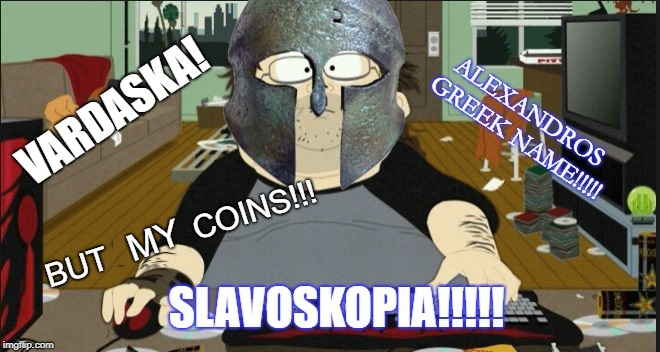
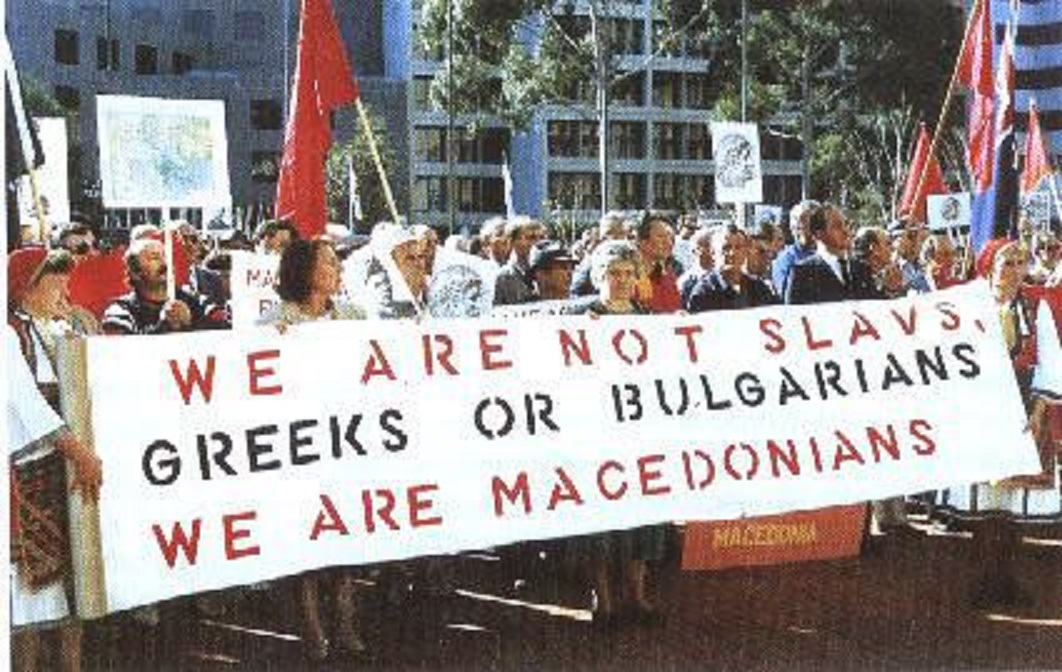
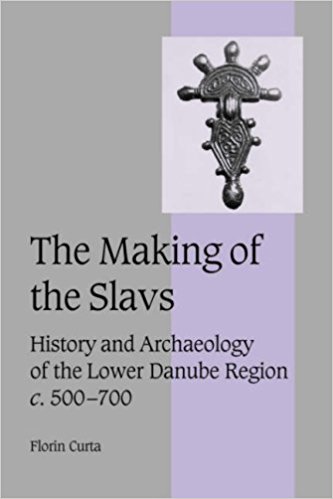
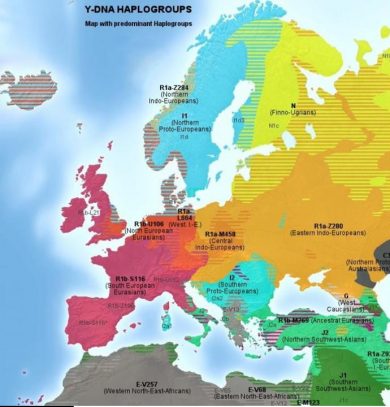 Slavs, geneticists isolated a special haplogroup-, a group of similar DNA variations, to be the “Slavic gene”. Named Haplogroup R1a, it naturally showed its highest frequencies in Poland, Ukraine, and Belarus, averaging 65%-70% [16]
Slavs, geneticists isolated a special haplogroup-, a group of similar DNA variations, to be the “Slavic gene”. Named Haplogroup R1a, it naturally showed its highest frequencies in Poland, Ukraine, and Belarus, averaging 65%-70% [16] 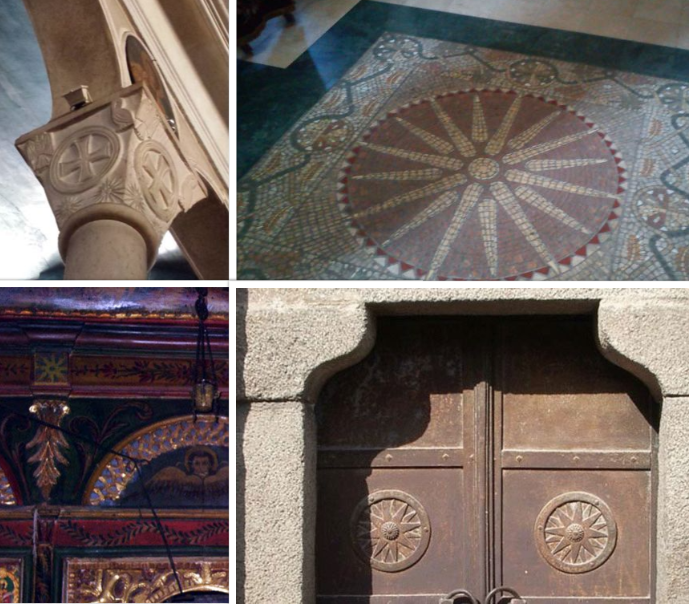
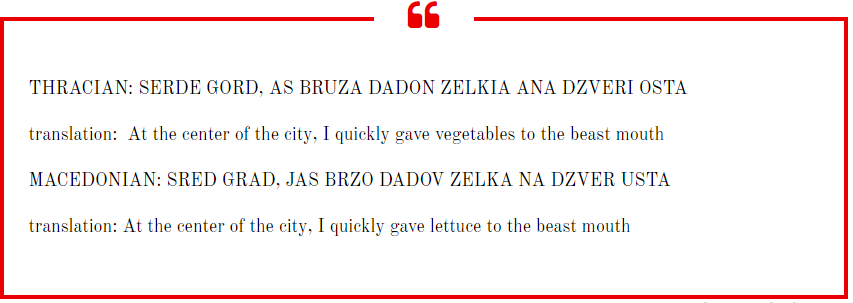
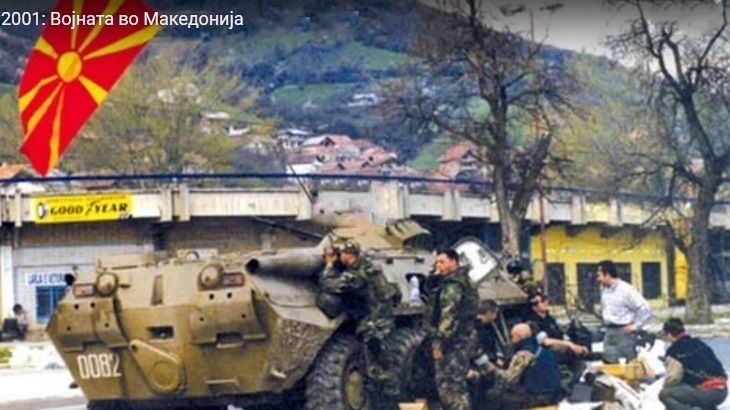



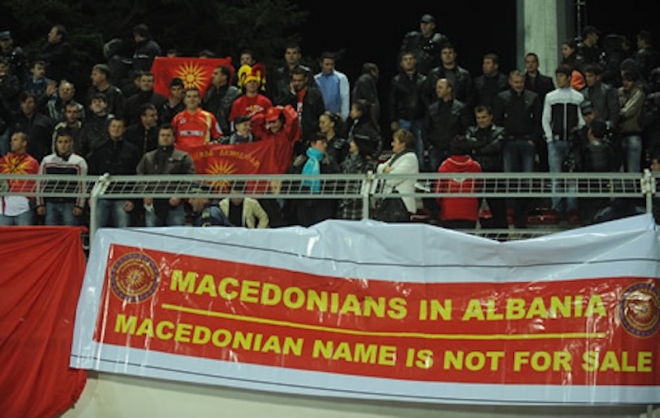

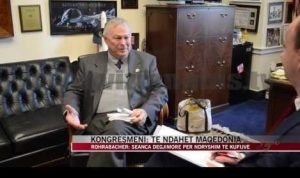 This outlandish statement was said during an
This outlandish statement was said during an 